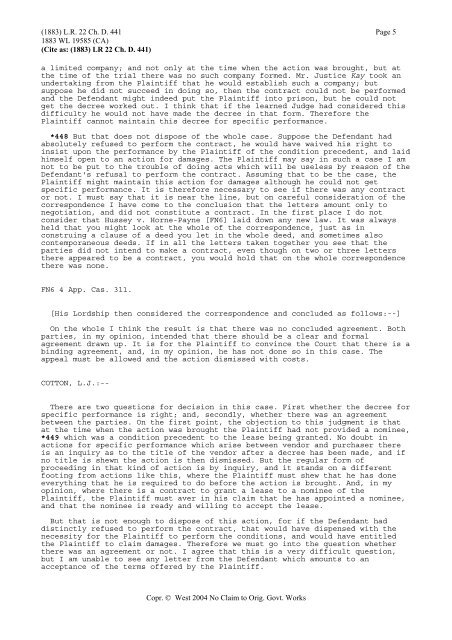Tesco v Constain - Thomson Reuters
Tesco v Constain - Thomson Reuters
Tesco v Constain - Thomson Reuters
Create successful ePaper yourself
Turn your PDF publications into a flip-book with our unique Google optimized e-Paper software.
(1883) L.R. 22 Ch. D. 441 Page 51883 WL 19585 (CA)(Cite as: (1883) LR 22 Ch. D. 441)a limited company; and not only at the time when the action was brought, but atthe time of the trial there was no such company formed. Mr. Justice Kay took anundertaking from the Plaintiff that he would establish such a company; butsuppose he did not succeed in doing so, then the contract could not be performedand the Defendant might indeed put the Plaintiff into prison, but he could notget the decree worked out. I think that if the learned Judge had considered thisdifficulty he would not have made the decree in that form. Therefore thePlaintiff cannot maintain this decree for specific performance.*448 But that does not dispose of the whole case. Suppose the Defendant hadabsolutely refused to perform the contract, he would have waived his right toinsist upon the performance by the Plaintiff of the condition precedent, and laidhimself open to an action for damages. The Plaintiff may say in such a case I amnot to be put to the trouble of doing acts which will be useless by reason of theDefendant's refusal to perform the contract. Assuming that to be the case, thePlaintiff might maintain this action for damages although he could not getspecific performance. It is therefore necessary to see if there was any contractor not. I must say that it is near the line, but on careful consideration of thecorrespondence I have come to the conclusion that the letters amount only tonegotiation, and did not constitute a contract. In the first place I do notconsider that Hussey v. Horne-Payne [FN6] laid down any new law. It was alwaysheld that you might look at the whole of the correspondence, just as inconstruing a clause of a deed you let in the whole deed, and sometimes alsocontemporaneous deeds. If in all the letters taken together you see that theparties did not intend to make a contract, even though on two or three lettersthere appeared to be a contract, you would hold that on the whole correspondencethere was none.FN6 4 App. Cas. 311.[His Lordship then considered the correspondence and concluded as follows:--]On the whole I think the result is that there was no concluded agreement. Bothparties, in my opinion, intended that there should be a clear and formalagreement drawn up. It is for the Plaintiff to convince the Court that there is abinding agreement, and, in my opinion, he has not done so in this case. Theappeal must be allowed and the action dismissed with costs.COTTON, L.J.:--There are two questions for decision in this case. First whether the decree forspecific performance is right; and, secondly, whether there was an agreementbetween the parties. On the first point, the objection to this judgment is thatat the time when the action was brought the Plaintiff had not provided a nominee,*449 which was a condition precedent to the lease being granted. No doubt inactions for specific performance which arise between vendor and purchaser thereis an inquiry as to the title of the vendor after a decree has been made, and ifno title is shewn the action is then dismissed. But the regular form ofproceeding in that kind of action is by inquiry, and it stands on a differentfooting from actions like this, where the Plaintiff must shew that he has doneeverything that he is required to do before the action is brought. And, in myopinion, where there is a contract to grant a lease to a nominee of thePlaintiff, the Plaintiff must aver in his claim that he has appointed a nominee,and that the nominee is ready and willing to accept the lease.But that is not enough to dispose of this action, for if the Defendant haddistinctly refused to perform the contract, that would have dispensed with thenecessity for the Plaintiff to perform the conditions, and would have entitledthe Plaintiff to claim damages. Therefore we must go into the question whetherthere was an agreement or not. I agree that this is a very difficult question,but I am unable to see any letter from the Defendant which amounts to anacceptance of the terms offered by the Plaintiff.Copr. © West 2004 No Claim to Orig. Govt. Works
















